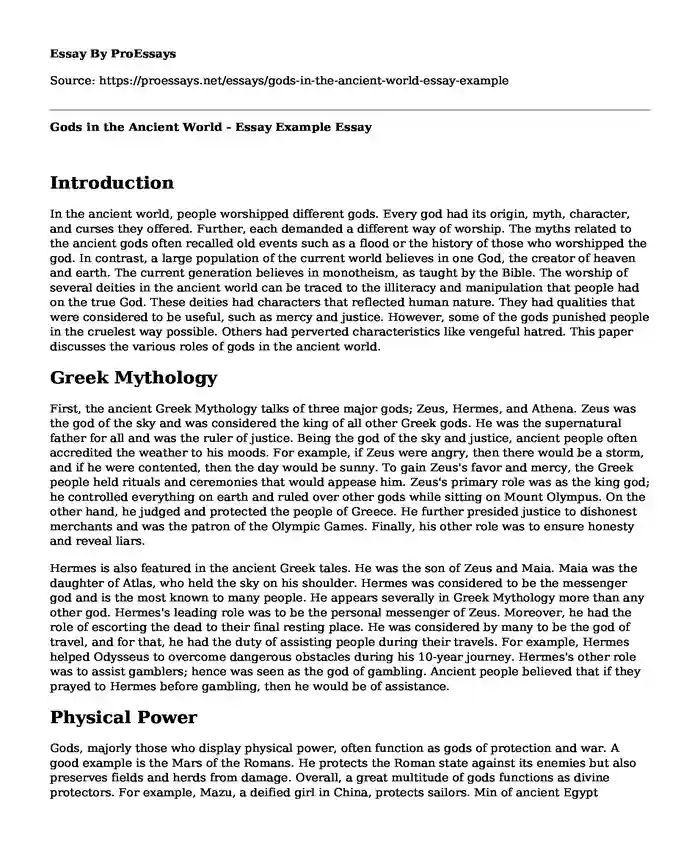Introduction
In the ancient world, people worshipped different gods. Every god had its origin, myth, character, and curses they offered. Further, each demanded a different way of worship. The myths related to the ancient gods often recalled old events such as a flood or the history of those who worshipped the god. In contrast, a large population of the current world believes in one God, the creator of heaven and earth. The current generation believes in monotheism, as taught by the Bible. The worship of several deities in the ancient world can be traced to the illiteracy and manipulation that people had on the true God. These deities had characters that reflected human nature. They had qualities that were considered to be useful, such as mercy and justice. However, some of the gods punished people in the cruelest way possible. Others had perverted characteristics like vengeful hatred. This paper discusses the various roles of gods in the ancient world.
Greek Mythology
First, the ancient Greek Mythology talks of three major gods; Zeus, Hermes, and Athena. Zeus was the god of the sky and was considered the king of all other Greek gods. He was the supernatural father for all and was the ruler of justice. Being the god of the sky and justice, ancient people often accredited the weather to his moods. For example, if Zeus were angry, then there would be a storm, and if he were contented, then the day would be sunny. To gain Zeus's favor and mercy, the Greek people held rituals and ceremonies that would appease him. Zeus's primary role was as the king god; he controlled everything on earth and ruled over other gods while sitting on Mount Olympus. On the other hand, he judged and protected the people of Greece. He further presided justice to dishonest merchants and was the patron of the Olympic Games. Finally, his other role was to ensure honesty and reveal liars.
Hermes is also featured in the ancient Greek tales. He was the son of Zeus and Maia. Maia was the daughter of Atlas, who held the sky on his shoulder. Hermes was considered to be the messenger god and is the most known to many people. He appears severally in Greek Mythology more than any other god. Hermes's leading role was to be the personal messenger of Zeus. Moreover, he had the role of escorting the dead to their final resting place. He was considered by many to be the god of travel, and for that, he had the duty of assisting people during their travels. For example, Hermes helped Odysseus to overcome dangerous obstacles during his 10-year journey. Hermes's other role was to assist gamblers; hence was seen as the god of gambling. Ancient people believed that if they prayed to Hermes before gambling, then he would be of assistance.
Physical Power
Gods, majorly those who display physical power, often function as gods of protection and war. A good example is the Mars of the Romans. He protects the Roman state against its enemies but also preserves fields and herds from damage. Overall, a great multitude of gods functions as divine protectors. For example, Mazu, a deified girl in China, protects sailors. Min of ancient Egypt protected travelers. The kami of the road in Japan also had the duty of protecting travelers. It is also the gods' role to protect women during their time of giving birth, and it is the same god who takes care of the born children as they grow up.
Conclusion
In conclusion, the Chinese, Japanese, Egyptians, and all other ancient people believed in a supernatural being. The supernatural being had control over everything. The gods controlled the weather, punished those who did unethical acts, and determined the outcome of wars. If an act angered a certain god, then he had to be appeased. People would organize rituals and ceremonies while asking for god's mercy and favor. If the people failed to appease the gods, a horrible event would occur to the given community. It was, therefore, paramount to keep the gods happy at all times. Most of ancient gods resided on mountains; Zeus being a good example as he performed all his duties from Mount Olympus.
Bibliography
Willis, Ika. "In the Time of Ancient Gods, Warlords, and Kings." A Handbook to the Reception of Classical Mythology (2017): 105.
Raaflaub, Kurt A. "Zeus and Prometheus: Greek Adaptations of Ancient Near Eastern Myths." In Cultural Contact and Appropriation in the Axial-Age Mediterranean World, pp. 17-37. Brill, 2017.
Cite this page
Gods in the Ancient World - Essay Example. (2023, Dec 12). Retrieved from https://proessays.net/essays/gods-in-the-ancient-world-essay-example
If you are the original author of this essay and no longer wish to have it published on the ProEssays website, please click below to request its removal:
- Culture Essay Example: Mexican American Heritage
- Transformation of Characters in 'War and Peace' Essay
- The Concept of Generational Clash in King Lear Paper Example
- Compare and Contrast Essay on Translation of the Opening Lines of the Odyssey
- Essay Sample on Declaration of Independence: Birth of US Freedom
- Essay Example on God Grants Humanity Dominion Over Nature
- Paper Sample on The Last Generation of Slavery: Booker T. Washington







